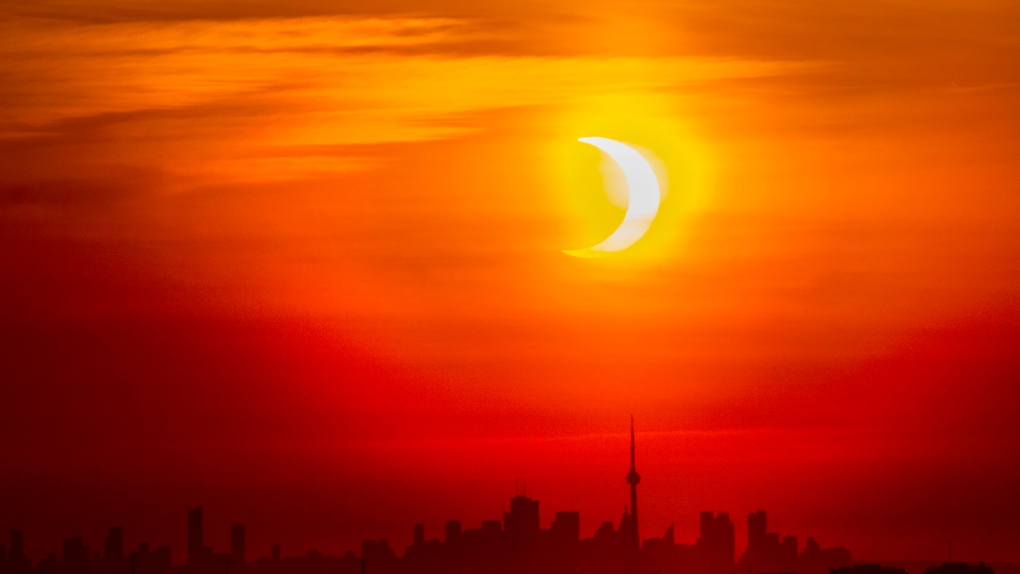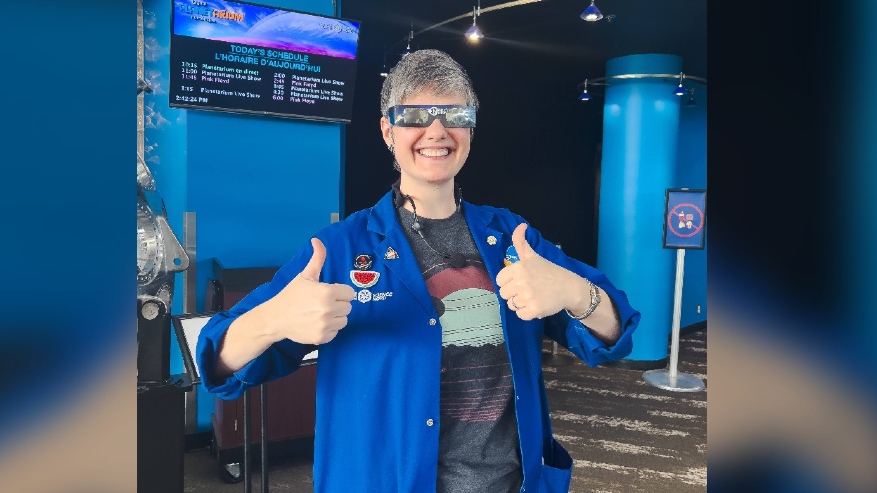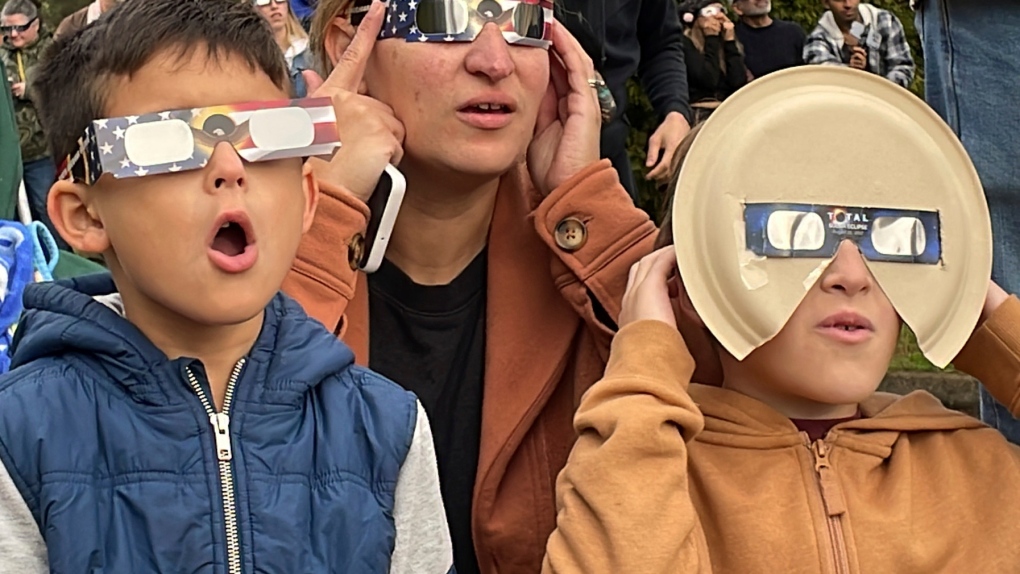Science North to celebrate rare solar eclipse with viewing party, hands-on activities
On April 8, a once-in-a-lifetime solar eclipse will sweep across North America.
Science North in Greater Sudbury is celebrating the rare celestial show by inviting the community to a free viewing party.
 An annular solar eclipse rises over the skyline of Toronto on Thursday, June 10, 2021. (The Canadian Press/Frank Gunn)
An annular solar eclipse rises over the skyline of Toronto on Thursday, June 10, 2021. (The Canadian Press/Frank Gunn)
“The eclipse will start at 2:05 p.m. and reach its maximum at 3:19 p.m.,” said officials with the science centre.
“At the eclipse maximum, 90 per cent of the Sun’s diameter will be eclipsed by the Moon.”
A solar eclipse occurs when a new Moon passes in front of the Sun, casting a shadow on the Earth.
Some areas experience a lighter shadow, called a penumbra, while others experience the full shadow, an umbra, and the path of the shadow is different for each eclipse.
“The Sun and Moon align roughly every 18 months,” Science North said in the news release.
“Ontario last witnessed a total solar eclipse in 1979 and the next won't occur here until 2106.”
The celebration at the science centre will include both indoor and outdoor activities, weather permitting.
The four local school boards in the Sudbury area moved their PA days to April 8 for safety due to the eclipse as the timing of the celestial event aligns with school dismissals.
The great outdoors
The outdoor activities will be held on the Science North grounds and will include solar telescope viewing, indirect viewing with pinhole viewers and other apparatus, direct viewing with special eclipse glasses and a visit with SNOLAB along with other hands-on science activities.
The outdoor activities are scheduled to run from 1 p.m. to 4:30 p.m.
“Visitors are encouraged to bring their own chair if they plan on taking part in the activities outside,” said staff.
Indoor activities
Inside the science centre a total solar eclipse live stream will be shown in Vale Cavern with access to the cavern included with the admission fee to the centre and there will also be special planetarium shows throughout the day at an additional cost.
The indoor activities are scheduled to run from 12:30 p.m. to 4 p.m.
“In the event of clouds or rain, all activities will take place in the Vale Cavern with a live stream of the total solar eclipse,” reads the news release.
50+ event
Earlier in the day, from 10 a.m. to 11 p.m., the science centre will also be hosting a 50+ solar eclipse social – including an informative talk by one of the centre’s staff scientists.
 Dr. Olathe MacIntyre, PhD, Science North's staff scientist of Space Place and Planetarium shows off eclipse glasses at the science centre. (Science North)
Dr. Olathe MacIntyre, PhD, Science North's staff scientist of Space Place and Planetarium shows off eclipse glasses at the science centre. (Science North)
“Before viewing the eclipse, join passionate space enthusiast, and former astronaut candidate, Dr. Olathe MacIntyre, PhD, Staff Scientist of Space Place and Planetarium, for a 30-minute talk on the science of solar eclipses,” Science North said on their website.
“Learn about the phenomenon, how it has been used for science, and some of the unexpected consequences of a solar eclipse.”
Following the talk, MacIntyre will host a Q&A session.
Attendees of the social will also receive a pair of eclipse glasses and be treated to light refreshments.
Tickets to the social are available on the Science North website or can be purchased in person at the science centre – the tickets include the cost of admission to the centre.
Getting eclipse glasses
For those wanting to purchase eclipse glasses ahead of time, they are available for purchase from the centre’s Whizards gift shop.
“Visitors who purchase a general admission ticket or members who reserve their ticket on April 8 will receive one pair of glasses (while supplies last),” reads the news release.
 Eclipse watchers observe the totality phase of the eclipse in Eugene, Ore., on Oct. 14, 2023. (Claire Rush / AP Photo)
Eclipse watchers observe the totality phase of the eclipse in Eugene, Ore., on Oct. 14, 2023. (Claire Rush / AP Photo)
The centre will also provide “certified eclipse glasses” free of charge on a first-come, first-served basis for those attending the festivities outdoors.
Safe viewing
“It is not safe to look directly at the Sun without specialized eye protection for solar viewing,” said science centre staff.
“If you don’t have eclipse glasses, you can use an indirect viewing method, which does not involve looking directly at the Sun.”
For more information about indirect viewing, please visit the Canadian Space Agency's website.
CTVNews.ca Top Stories

Bail and promises of justice: The case of Canadians Daniel Langlois and Dominique Marchand murdered in Dominica
A year has passed since Canadians Daniel Langlois and Dominique Marchand were found dead in a burned-out car in Dominica, and there has yet to be justice for the philanthropists who were beloved by many on the island.
'We're going to be very visible': Minister Champagne on border plan amid Trump's tariff threat
Industry Minister François-Philippe Champagne says the Canadian presence at the border it shares with the U.S. will be “very visible” in response to U.S. president-elect Donald Trump’s recent tariff threats.
Questions arise about effectiveness of body-worn police cameras in Canada
Questions surrounding the death of a man by Winnipeg police are rekindling conversations around the need for officers to wear body cameras.
Canadian team told Trump's tariffs unavoidable right now, but solutions on the table in surprise Mar-a-Lago meeting
During a surprise dinner at Mar-a-Lago, representatives of the federal government were told U.S. tariffs from the incoming Donald Trump administration cannot be avoided in the immediate term, two government sources tell CTV News.
Pedestrian killed by Via Rail train near Kingston, Ont.
Regular rail traffic has resumed with severe delays.
Muskoka reacts to major snowfall, hundreds stuck on Highway 11
From road closures, power outages, weather declarations and nonstop shovelling, Muskoka residents were faced with nearly a metre of persistent snowfall on Saturday.
Saskatoon priest accused of sexual assault says he meant to encourage young girl with hug and kiss
A Saskatoon priest accused of sexual assault says he meant to encourage and reassure a young girl when he hugged and kissed during his testimony at Saskatoon Provincial Court Friday.
Beef prices reach record highs in Canada
The cost of beef continues to rise, reaching record highs on grocery store shelves ahead of the busiest time for many grocers and butchers before the holiday season.
Trump threatens 100% tariff on the BRIC bloc of nations if they act to undermine U.S. dollar
U.S. president-elect Donald Trump on Saturday threatened 100 per cent tariffs against a bloc of nine nations if they act to undermine the U.S. dollar.


































